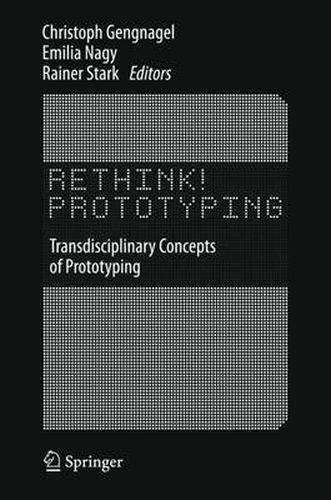Readings Newsletter
Become a Readings Member to make your shopping experience even easier.
Sign in or sign up for free!
You’re not far away from qualifying for FREE standard shipping within Australia
You’ve qualified for FREE standard shipping within Australia
The cart is loading…






This title is printed to order. This book may have been self-published. If so, we cannot guarantee the quality of the content. In the main most books will have gone through the editing process however some may not. We therefore suggest that you be aware of this before ordering this book. If in doubt check either the author or publisher’s details as we are unable to accept any returns unless they are faulty. Please contact us if you have any questions.
In this book, the authors describe the findings derived from interaction and cooperation between scientific actors employing diverse practices. They reflect on distinct prototyping concepts and examine the transformation of development culture in their fusion to hybrid approaches and solutions.
The products of tomorrow are going to be multifunctional, interactive systems - and already are to some degree today. Collaboration across multiple disciplines is the only way to grasp their complexity in design concepts. This underscores the importance of reconsidering the prototyping process for the development of these systems, particularly in transdisciplinary research teams.
Rethinking Prototyping - new hybrid concepts for prototyping was a transdisciplinary project that took up this challenge. The aim of this programmatic rethinking was to come up with a general concept of prototyping by combining innovative prototyping concepts, which had been researched and developed in three sub-projects: Hybrid Prototyping developed new prototyping approaches to validate and evaluate holistically developed systems with their services, infrastructure and business models. Blended Prototyping addressed a new technique whereby prototypes for user interfaces of software applications can be generated from hand drawings and immediately be tested. Beyond Prototyping examined the issue of the prototype in connection with algorithmically generated design for producing
tailor-made products.
$9.00 standard shipping within Australia
FREE standard shipping within Australia for orders over $100.00
Express & International shipping calculated at checkout
This title is printed to order. This book may have been self-published. If so, we cannot guarantee the quality of the content. In the main most books will have gone through the editing process however some may not. We therefore suggest that you be aware of this before ordering this book. If in doubt check either the author or publisher’s details as we are unable to accept any returns unless they are faulty. Please contact us if you have any questions.
In this book, the authors describe the findings derived from interaction and cooperation between scientific actors employing diverse practices. They reflect on distinct prototyping concepts and examine the transformation of development culture in their fusion to hybrid approaches and solutions.
The products of tomorrow are going to be multifunctional, interactive systems - and already are to some degree today. Collaboration across multiple disciplines is the only way to grasp their complexity in design concepts. This underscores the importance of reconsidering the prototyping process for the development of these systems, particularly in transdisciplinary research teams.
Rethinking Prototyping - new hybrid concepts for prototyping was a transdisciplinary project that took up this challenge. The aim of this programmatic rethinking was to come up with a general concept of prototyping by combining innovative prototyping concepts, which had been researched and developed in three sub-projects: Hybrid Prototyping developed new prototyping approaches to validate and evaluate holistically developed systems with their services, infrastructure and business models. Blended Prototyping addressed a new technique whereby prototypes for user interfaces of software applications can be generated from hand drawings and immediately be tested. Beyond Prototyping examined the issue of the prototype in connection with algorithmically generated design for producing
tailor-made products.